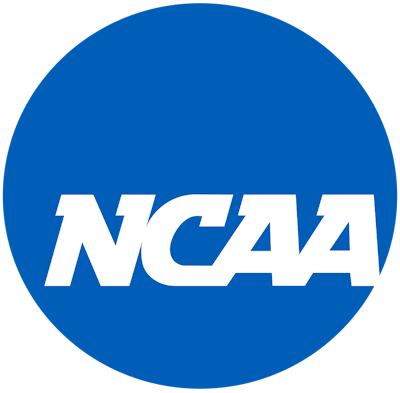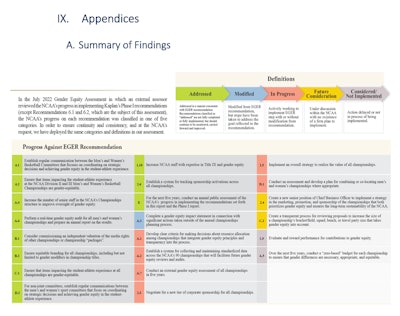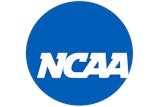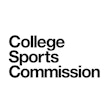
While the NCAA is making progress at advancing gender equity across the NCAA championships, a review of the association's work on the problem with respect to an initial July 2022 third-party review was released this week and notes that the association has yet to take true ownership of the issue.
"In the course of our work, we repeatedly heard that, historically, there has been “no ownership of gender equity” at the NCAA and that this deficiency persists today," the report stated. "This lack of ownership seems to have been proliferated and prolonged by significant turnover in the NCAA’s senior leadership over the last three years, including in the positions of NCAA President, Chief Financial Officer and the Senior Vice President over the Office of Inclusion. The NCAA’s divided governance structure – a National Office staff coupled with a robust member-run committee structure – also seems to have contributed to a lack of clarity over who “owns” gender equity."
Author of the report, Lewis Rice, noted that Phase I of the External Gender Equity Review put the men's and women's basketball championships under a microscope, and given the smaller scale of that report, the problems were easier to resolve. However, this second phase of the review, which looks at 88 championships across three divisions and 24 sports, is more difficult to address. While Lewis Rice found that nearly everyone at the NCAA has been cooperative in their interviews and work towards addressing gender equity, the very structure of the NCAA is problematic.
Related: Lawmakers Slam NCAA Over Gender Equity Failures
"The lack of ownership of the Association’s gender equity work and, ultimately, its outcomes seems to be a direct consequence of the partitioned corporate structure of the NCAA National Office and the NCAA’s divided governance structure, which vests decision-making about critical aspects of championships with member-led committees," the authors wrote. "There is no lack of talent at the NCAA National Office or in the composition of its governing committees, but there is a lack of communication and coordination that, at times, has stood as an obstacle to implementing consistent and Association-wide changes in line with Kaplan’s recommendations. Indeed, even responsibility for achieving and enforcing the NCAA’s commitment to 'diversity, inclusion and gender equity among its student-athletes, coaches and administrators' remains fractured. (See NCAA Inclusion Statement)."
NCAA president Charlie Baker said in a statement that he'll continue to champion the issue.
"A continued commitment to equity must be at the center of everything in college sports," NCAA president Charlie Baker said in a statement. "Since I joined the NCAA this year, the NCAA adjusted the championships bid process to be more innovative and to prioritize equitable championship experiences across all sports and host locations. I also directed national office senior leadership and staff to be relentless in striving to achieve equity in all that we do – including at all NCAA championships – and I urge leaders at all colleges and universities to prioritize equity throughout college sports. I will continue to push the Association to examine our efforts in the years to come as we focus on fairness and equity for college athletes because every competitor deserves a shot at the unmatched opportunity college sports provides."
The NCAA is still in the process of addressing recommendations from Kaplan Hecker & Fink's initial report, and 72-page review offers an evaluation of progress made in all of those areas.
Of the initial 22 recommendation included in the July 2022 third-party assessment, Kaplan Hecker & Fink found that 11 of the items have been addressed, one item had been modified, six are in progress, two have been set for future consideration, and two have been considered but not implemented at all.






































